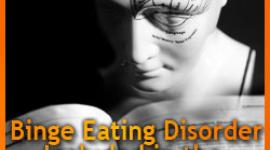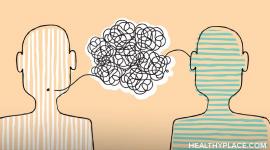Eating Disorders Treatment: HealthyPlace Newsletter
Focus on why eating disorder recovery is so difficult. Other topics: bipolar depression, social anxiety, and where to find support for mental illness.
Here's what's happening on the HealthyPlace site this week:
- Recovering from an Eating Disorder
- "Eating Disorders Treatment: Recovery from Eating Disorders and Why It's So Darn Difficult" On HealthyPlace TV
- More Information on Eating Disorders
- Bipolar Depression
- Followup: Extreme Shyness and Social Anxiety
- Where Can I Find Support For...? (if you're living with a mental illness)
Recovering From An Eating Disorder
SOARING numbers of young girls are being treated in hospitals for eating disorders.
A new report shows cases of bulimia and anorexia among girls under 18 have leapt by 47 percent from 2004 to 2008. In the UK, there has also been a 25 per cent rise in girls UNDER NINE being treated for eating disorders.
Recovery from an eating disorder is no walk in the park, which is why so many people suffering from anorexia, bulimia, binge eating or compulsive overeating never make it to the other side of recovery.
Eating Disorders treatment specialist, Joanna Poppink, MFT, has been treating eating disorder patients for over 20 years. Her website, Triumphant Journey: A Cyberguide To Stop Overeating and Recover from Eating Disorders, is in the HealthyPlace.com Eating Disorders Community.
In three new articles, she discusses the journey people must take when they are serious about eating disorders treatment.
- Eating Disorder Recovery: Living A Balanced Life
- Getting Better and Losing Friends During Eating Disorder Recovery
"Eating Disorders Treatment: Recovery from Eating Disorders and Why It's So Darn Difficult" On HealthyPlace TV
Our guest has been battling anorexia and bulimia for over 15 years. Shannon Cutts, author of "Beating Ana," will be sharing her struggle and the issues involved in overcoming an eating disorder.
This Tuesday night, June 2. The show starts at 5:30p PT, 7:30 CT, 8:30 ET and airs live on our website.
- TV Show Blog with this week's show info
In the second half of the show, you get to ask Dr. Harry Croft, your personal mental health questions. Watch the show on-demand.
Also this month on HealthyPlace TV
- Treating Borderline Personality Disorder: Is It Possible?
- Child Abuse and Its Impact Later in Life
- Your Child's Mental Health: What Every Parent Should Know
If you would like to be a guest on the show or share you personal story in writing or via video, please write us at: producer AT healthyplace.com
Click here for a list of previous HealthyPlace Mental Health TV Shows.
continue story below
More Information on Eating Disorders
- What is an Eating Disorder?
- Body Image Issues
- Eating Disorders Online Test
- Types of Treatment for Eating Disorders
- Treatment for Anorexia, Bulimia Can Be Difficult
- Eating Disorders and Their Impact on Relationships
- How to Help a Child or Friend with Eating and Body Image Issues
Bipolar Depression
When it comes to Bipolar Disorder, most people think of the manic episodes that are connected with the disorder; which is why the other flavor of Bipolar Disorder, Bipolar Depression, is often overlooked and misdiagnosed. Bipolar Depression also carries a higher risk of suicide.
We have a new section on Bipolar Depression in the HealthyPlace.com Bipolar Community. It's written by award-winning mental health author, Julie Fast, who wrote the "Gold Standard of Treating Bipolar Disorder" and the "Gold Standard of Treating Depression" for HealthyPlace.com.
In easy-to-understand language, Julie provides an authoritative look at Bipolar Depression:
- Differences Between Unipolar Depression and Bipolar Depression
- Why Bipolar Depression is Often Misdiagnosed
- Role of Mania in Bipolar Depression
- Treatment and Medications for Bipolar Depression
- Treatment Differences Between Depression and Bipolar Depression
- Bipolar Depression Management Tips
- Bipolar Depression Special Section: Table of Contents
Getting a correct diagnosis for Bipolar Depression is not easy, but it's very important. A misdiagnosis can lead to incorrect treatment which can be hazardous to your mental health.
Followup: Extreme Shyness and Social Anxiety
Marjie Braun Knudsen's story on "How to Help Your Child Overcome Shyness and Social Anxiety" really resonated with many of our readers. For years, Marjie's daughter truly suffered with social anxiety. She was paralyzed with fear when it came to interacting with other children and handling everyday social situations.
Here are a few reader comments in response to the story:
- Mike P: "When I was in school, all the kids and teachers called me 'quiet Mike'. I sat in my chair and honestly don't remember saying a word to anyone, even when they talked to me. I would just put my head down on the desk. I was scared to death everyday, hoping the teacher wouldn't call on me for some answer. When that happened, I would start shaking violently. I'm 27 now, taking an antidepressant and sitting alone in my cubicle at work."
- Elizabeth: "I had a counselor when I was in school and then at the beginning of eighth grade they sent me right across the street to a special school for troubled kids. All those kids had no problem talking to their peers or teachers. It was just me and I honestly thought I was the only person in the world with my problem (Social Phobia, Social Anxiety Disorder) I didn't know what was wrong with me. I just knew I couldn't wait until I was old enough to quit school so those kids couldn't tease me anymore. Today, I'm so lonely. I've got no friends. All I want is my life back."
- Diana: "My son had the same problem as the author of the article. From the age of 4, he was extremely shy. His preschool and later, school teachers, would call me and say they were worried about his "brain development." We were fortunate in that his pediatrician recognized the problem and after four years of therapy I can say it's made a world of difference. He's more self-confident and can get along with others. For other parents going through the same thing with their children, I want you to know it was a very trying time for us, but it's important to get help right away. The longer you wait and procrastinate (which we did for about a year), the more it affects your child's emotional development."
Where Can I Find Support For...?
Living with a mental illness, whether you have one or you're a parent, family member or close friend of someone who does, can be a challenge on a daily basis. It's not unusual to feel like "I'm the only one" going through this, which unfortunately can lead to depression, anxiety and isolation. Getting support, joining a mental health support group, can be so very helpful in letting you know you are not alone and giving you an outlet to safely express your feelings. There are groups for mental health patients as well as family members and loved ones.
Online, you can join the HealthyPlace Mental Health Support Network. If you're looking for face-to-face meetings for:
- Bipolar Disorder and Depression, there's the Depression and Bipolar Support Alliance.
- The National Alliance on Mental Illness (NAMI) has groups for Bipolar Disorder and Schizophrenia.
- For Anxiety Disorders, there's the Anxiety Disorders Association of America.
- CHADD (Children and Adults with ADHD) offers support for ADHD.
- Mental Health America can also assist you in finding a support group.
Chapters of each group exist across the United States.
Also try contacting your county mental health association, local United Way and county psychological association. Usually, they can lead you in the right direction in finding a support group in your community.
back to: HealthyPlace.com Newsletter Index
APA Reference
Staff, H.
(2009, June 1). Eating Disorders Treatment: HealthyPlace Newsletter, HealthyPlace. Retrieved
on 2025, April 17 from https://www.healthyplace.com/other-info/mental-health-newsletter/eating-disorders-treatment



